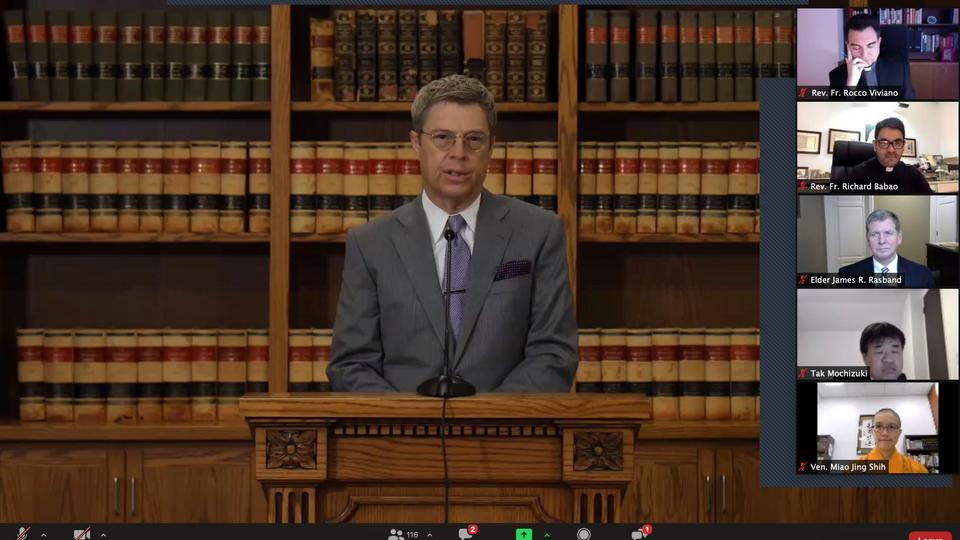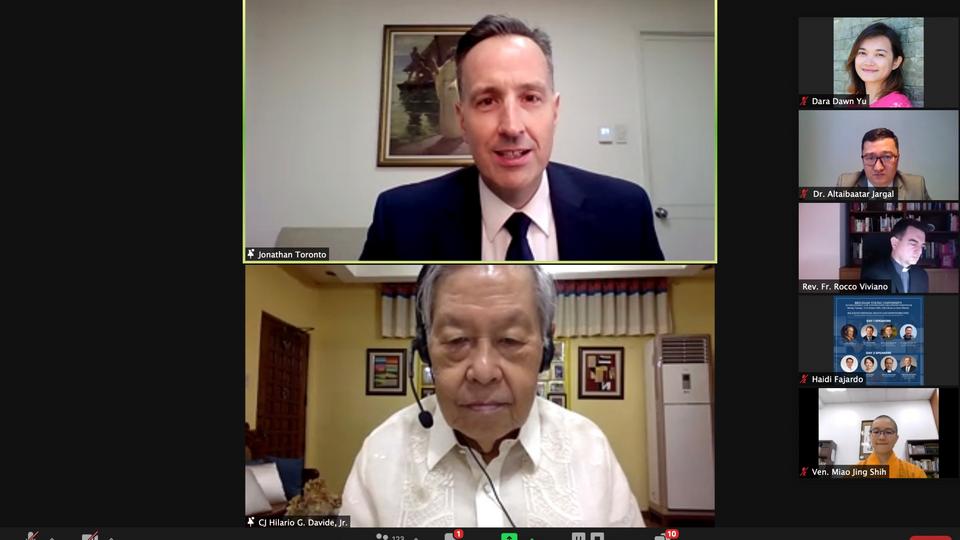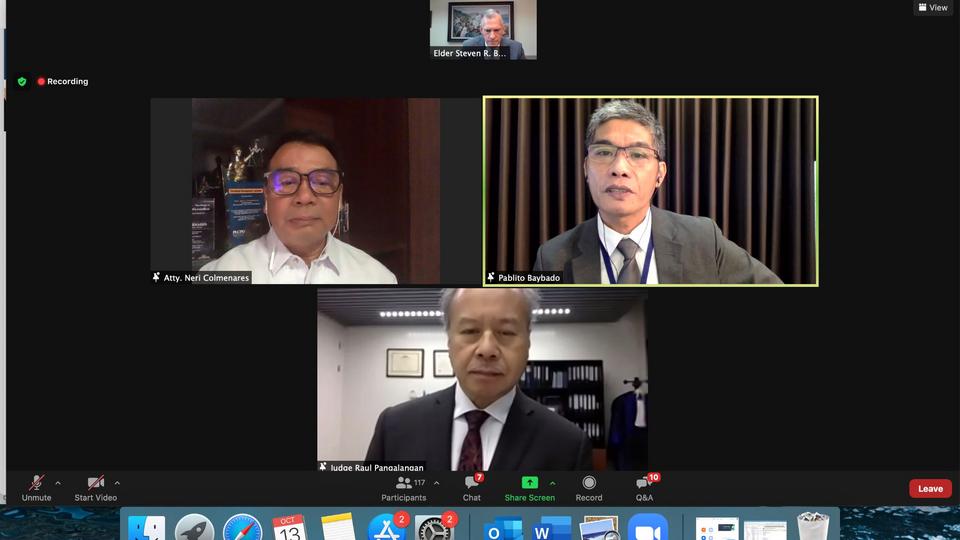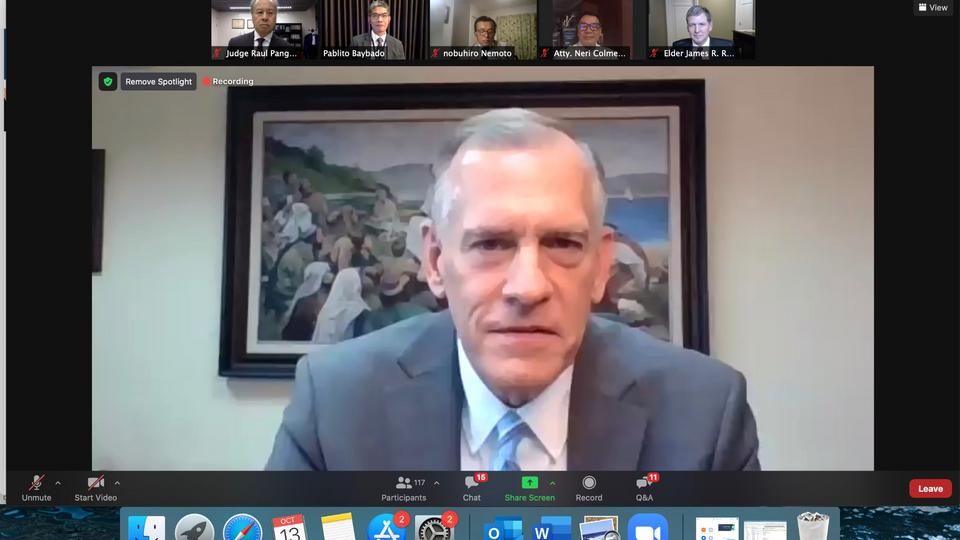Hundreds of participants joined the virtual Law and Religions Symposium hosted by the Brigham Young University International Center for Law and Religion Studies (BYU-ICLRS) last 12-13 October 2020. With the theme Religious Freedom: Rights and Responsibilities, the meeting was viewed by legal experts, lawyers, academic scholars, religious leaders, law students, and religious freedom advocates from all over Asia over a Zoom webinar.
Watch the full recording of Day 1 on the International Forum on Law and Religion Facebook page.
Watch the full recording of Day 1 on the International Forum on Law and Religion Facebook page.
Jonathan Toronto from the Philippines Area Legal Counsel of The Church of Jesus Christ of Latter-day Saints hosted and moderated the first day and were joined by various religious thought leaders from BYU, Mongolia, Japan, and the Philippines.
Professor Brett Scharffs, Director of the International Center for Law and Religion Studies of Brigham Young University, opened the online symposium by giving an overview of how religious rights and responsibilities are addressed in the global international human rights framework.
He talked about the rise of rights and responsibilities during the drafting of the universal declaration of human rights, his conceptual thinking about the web of relationships that are created by rights and responsibilities, and the responsibilities that extend beyond rights.
“The preamble recognizes that the dignity of people is not something bestowed by states to individuals, but it is inherent in our humanity. The equal and inalienable rights are not granted but made possible by the traits and endowments with which we are born," said Scharffs.
He then continued his talk by quoting two words from Article 1 of the Universal Declaration of Human Rights - reason and conscience. According to Professor Scharffs, the inclusion of the idea of conscience in Article 1 has an interesting backstory. The inclusion of conscience was that the suggestion of the Chinese delegate PC Chang. In addition to reason, the idea of Ren, which is a Chinese concept, was born.

A composite of the Chinese characters for man and two, ren means two-man mindedness. “It implies ideas of empathy, the consciousness of one's fellow men, humanity, or benevolence. This Chinese concept was translated into English as the word conscience, but unfortunately, this translation does not quite capture the meaning of Ren conscience," he said.
Professor Scharffs gave emphasis on bringing empathy, other-mindedness, and broad perspective to the analysis of rights and responsibilities and invited everyone to be mindful and reflect more deeply upon the others to whom we owe responsibilities.

Chief Justice Hilario Davide Jr. (ret) of the Supreme Court of the Philippines extended the previous message by talking about the responsibilities that religious freedom entails. “The basic principle of the declaration tells us that it is not freedom from responsibility, but freedom with responsibility," he said.
Chief Justice Davide reminded everyone that the current pandemic is not a hindrance but an opportunity to come together to discuss religious freedom. “Symposiums and events serve as a cornerstone of humanity's progress, development and stability," he mentioned. He concluded his message by encouraging everyone to work together to establish a better society where religious freedom can be attained.
Rev. Fr. Rocco Viviano, Ph.D. next addressed the online audience by focusing on the marginalization of religion. He mentioned the subtle attack on religious freedom, where oftentimes religion is characterized as irrelevant or destabilizing to society.
“Peace is not the ultimate goal of interfaith relations. It is to seek the truth together," he concluded. Fr. Viviano is the Interreligious Dialogue coordinator for the Japanese Province of the Catholic Religious order of the Xaverian Missionaries.
The last speaker for the 1st day of the Symposium was Dr. Altaibaatar Jargal from The Community Organization of Religious Scholars of Mongolia. After recounting the history of Mongolia with regards to religious freedom, Dr. Altaibaatar reminded the audience that even though Mongolia is relatively younger to this field of discussion, it has placed great emphasis on the importance of its contribution.
Addressing the numerous traditional and modern religions in Mongolia, Dr. Jargal pointed out: “Although we have differences in belief, I think the thing we have in common is the desire to create a better world together”.
Dr. Jargal has been working as an executive director of the Mongolian Association for the Study of Religion since 2010. He does research works about religion and social issues, new religious movements, the relation between state and church, and government policy on religious matters.
| Temple Square is always beautiful in the springtime. Gardeners work to prepare the ground for General Conference. © 2012 Intellectual Reserve, Inc. All rights reserved. | 1 / 2 |
Day 2 of the BYU ILRS Asia Online was equally educating as speakers from Japan and the Philippines were featured by Professor Pablito Baybado Jr., Deputy Secretary-General of Religions for Peace Philippines, hosted and moderated for the final day of the symposium.
A message from Reverend Kosho Niwano, as told by Reverend Megumi Wada, opened the session. Rev. Niwano talked about how the pandemic has raised a concern for the religious communities as basic rights such as religious gatherings have been prohibited.
“However, the pandemic has allowed people and religious organizations to find creative ways to exercise their religious practices," mentioned Rev. Niwano. “I think we need to be deeply aware that it gives an opportunity to be the hands and feet of God and Buddha and work together as individuals and as religious communities to ensure that the presence, compassion, love, and care of God are felt by those around us," concluded Rev. Niwano.
Reverend Kosho Niwano is the President-designate of Rissho Kosei-kai and the co-Moderator and an Executive Committee Member of Religions for Peace.
The second keynote speaker was Judge Raul Pangalangan of the International Criminal Court. His talk centered on the constitutional protection of religious worship. In his many years of experience, he noticed the role of religion in the changing nature of warfare.

According to Judge Pangalangan, “The destruction of religious identity and attacking religious symbols like temples and rituals is not the mere side effect of war. It is part of the conduct of facilities. If the aim of war is to destroy the enemies with the fight, then destroying a people's sense of identity, their source of unity is just as effective as dropping bombs and shooting cannons."
On the other hand, Judge Pangalangan recognized the rising trend of increased appreciation for the vital role of religious temples, holy books and the performance of sacred rituals in constituting the life and identity of peoples and communities and how it affects the waging of war. In that context, “religion is both a means and an end," Pangalangan concluded.
Going in line with the subject of human rights in relation with religious freedom, Attorney Neri Colmenares, President of the National Union of People’s Lawyers presented The Demise of Strict Separationism and the Rise of Benevolent Neutrality: The Case of In Re Valenciano.
“The free exercise and enjoyment of religious profession and worship, without discrimination or preference, shall forever be allowed," Colmenares stated. Making the preamble the center of his message, Atty. Colmenares answered common concerns on the subject of religious freedom and the state’s stand.
Pointing out the fact that only a compelling interest of the state can prevail over the fundamental right to religious liberty, Colmenares closed by quoting Victorino 59 SCRA 54 where it states: “It has been said that the religion clauses of the Constitution are all designed to protect the broadest possible liberty of conscience, to allow each man to believe as his conscience directs, to profess his beliefs, and to live as he believes he ought to live, consistent with the liberty of others and with the common good.”

The final speaker for the online symposium was Elder Steven R. Bangerter, General Authority Seventy and currently serving as the first counselor of the Philippines Area Presidency of The Church of Jesus Christ of Latter-day Saints. Having worked as an attorney representing religious organizations for almost 25 years, Elder Bangerter recounted cases when people remained resilient even though they were attacked because of their religious practice.
“The most impressive observation to me was the common thread running through them all. It is that they were inspired to do good things as a result of their religious, faith-based conscience. I marvel as I see vast numbers of faithful people come together to feed the hungry, minister to the sick, and in all ways care for the poor and those in need. They exert coordinated, inspired efforts to influence lawmakers and to protect the sanctity of religious practices and beliefs," he shared.
Elder Bangerter closed the symposium by this invitation: “We must stand together in our determination to promote, maintain and protect the religious freedoms for which the conscience of every faith-based individual yearns. As we serve alongside those of other faiths, we not only build our communities and improve our relationships, we also become better disciples ourselves.
About the BYU International Forum on Law and Religion
The International Forum on Law and Religion is an annual symposium organized by Brigham Young University International Center for Law and Religion Studies. It seeks to provide an avenue for legal experts, academic scholars, and religious freedom advocates to share their knowledge and expertise on religious freedom issues as well as its challenges and opportunities to help balance religious liberties and individual rights.